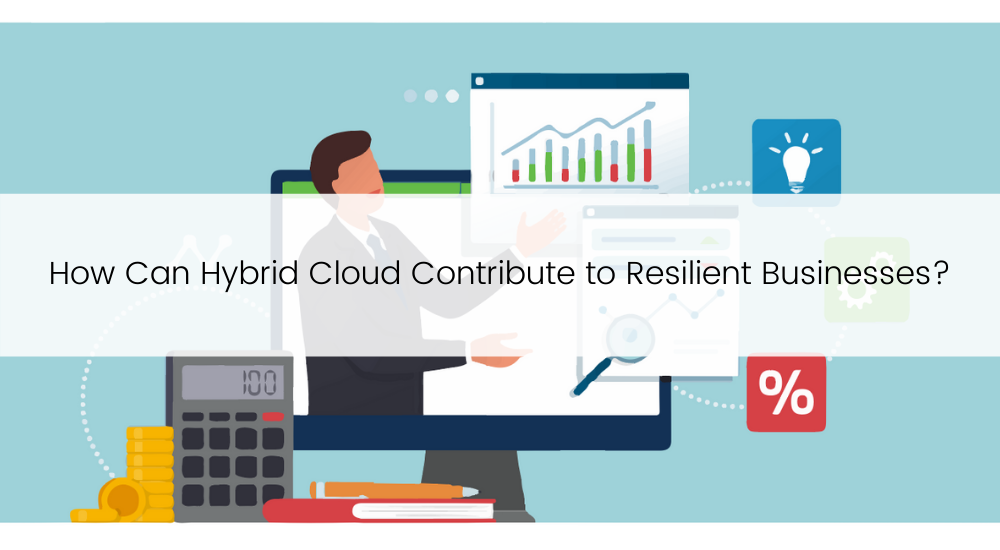
The COVID-19 pandemic has changed the landscape for businesses, and there's no end in sight. Nearly 50% of companies plan to continue work-from-home policies after the pandemic abates. As a result of increased numbers of employees working remotely, cyberattacks are skyrocketing as IT teams struggle to secure remote endpoints. Since May 2020, 90% of companies have experienced an increase in attempted breaches. Meanwhile, customer-demand patterns shift wildly and will continue to for the foreseeable future.
How do businesses establish resiliency? More specifically, how should businesses:
- Ensure they continue operations regardless of remote work?
- Adjust to rapid swings in customer demand?
- Defend against emboldened cyberattackers?
Moving to Hybrid Cloud can help businesses weather threats and exploit opportunities during these uncertain times.
What's Wrong with the On-Premise Only Approach?
Hybrid Cloud helps businesses respond to the unexpected, while a purely Private Cloud solution does not.
Let's start with working from home. In the immediate aftermath of the pandemic, companies often set up connectivity, using a Private Cloud as a hub for all business communication.
For example, if an employee wanted to access a SaaS application, they first sent a request through the VPN to the private data center, connected through the firewall at a remote data center. The VPN request then traveled over the internet to reach the app they needed. The data from that application would then travel back the same way it arrived. VPN requests worked well enough when business travelers used it but did not scale well when so many workers moved to remote work. Overwhelmed by the frustration of slow VPN speeds and the associated reduced productivity, many users abandoned VPN connections.
Users who stick with VPN connections cannot rely on its protection. Attackers have been taking advantage of unpatched vulnerabilities in VPN since the beginning of the pandemic. Cybercriminals have been attacking remote desktop support applications; the recent Solarwinds breach is an example of this kind of attack.
Reliance on the Private Cloud also leaves businesses unequipped to scale. State governments found their unemployment websites crashing during the early pandemic, as did manufacturers of PPE. Should a business running solely on Private Cloud suddenly boom, scaling to meet new demand will require the deployment of additional servers, which is neither fast nor efficient. Conversely, for businesses needing to downsize, a reduction in physical servers presents different financial challenges - leaving them idling draws power and unnecessary expense.
The Hybrid Cloud Lets Businesses Respond to the Unexpected
A Hybrid Cloud approach offers businesses a level of responsiveness and pivotability that would be too slow and expensive to deploy in a private cloud.
Hybrid Cloud offers almost infinite scalability. For example, with Hybrid Cloud, scaling to accommodate a spike in web traffic requires just a solid internet connection, a few clicks, and tools like a Content Delivery Network (CDN) can help accommodate visitors from around the world. Employees enjoy faster connectivity and productivity—without compromising security.
Meanwhile, Hybrid Cloud offers secure alternatives to VPN. Management tools can enforce policy points between cloud services and users' endpoints. Effectively, they function as a VPN for the cloud services arena—allowing employees to access an imaged menu of services in the Cloud while ensuring their endpoints are secure and their credentials are not compromised.
Where to Begin When Transitioning to the Hybrid Cloud
Organizations have different business resiliency goals - the approach taken when moving to Hybrid Cloud should reflect those goals. Businesses should look at prioritizing investing in cloud technologies to capture the critical components of resilient operations: agility, security, compliance, accessibility, scalability, and responsible data management.
If you're confused about where to begin or what mixture of technologies to use, consider working with an experienced third party that understands Hybrid Cloud deployments. TBConsulting is a Managed Service Provider with expertise in Hybrid Cloud deployments and management. We can help your organization build a digital roadmap to incorporate resilient delivery of your business goals. For more information, contact TBConsulting today!
.png)

